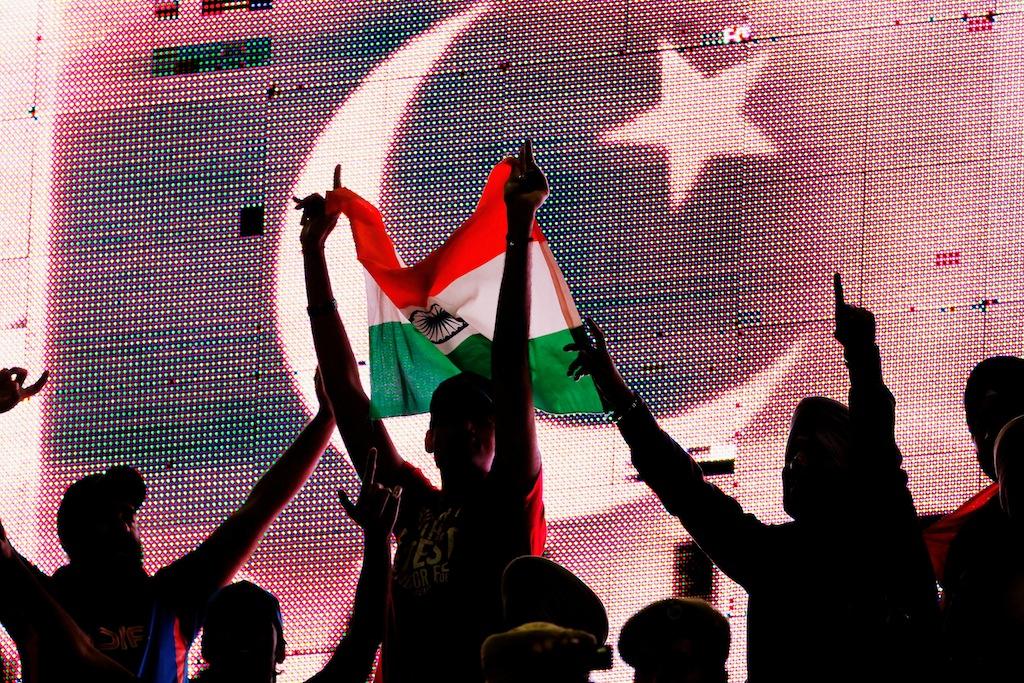Pakistan unrest spurs fear of military coup as tensions fray with India
Indian cricket fans hold an Indian flag as Pakistan’s flag is displayed in Mohali, India on March 30, 2011.
Protests at home and tensions with India are threatening Pakistan's stability ahead of a general election.
Cleric Tahir Qadri and tens of thousands of protesters in Pakistan's capital are outside Parliament, calling for the expulsion of Prime Minister Raja Pervez Ashraf as tensions between India and Pakistan mount just months before Pakistan's elections.
"There is no Parliament," Qadri said in a recent speech. "There is a group of looters, thieves and dacoits. Our lawmakers are the lawbreakers."
On Monday, Pakistan's top court called for Ashraf's arrest on criminal charges of bribery, instigating massive protests in Islamabad.
The Human Rights Commission of Pakistan said the court's decision might harm democracy in Pakistan.
"Attempts to regulate politics through judicial hustling have never been fruitful anywhere in the world. If nothing else, the judiciary has to weigh the consequences of its decisions on the state whose interest it is supposed to safeguard. With all due respect to the Supreme Court, it appears certain that the decision on the prime minister’s arrest will not escape censure by democratic opinion."
As anti-government protests continue in Islamabad and protesters call to oust Ashraf, the prospect of a military coup has been raised by some experts.
"Most people in Pakistan think Qadri is being backed by the Pakistani establishment, particularly the Pakistani army," senior Karachi journalist Ghazi Salahuddin told DW news, adding that he believed a military coup was possible.
Political analyst Hasan-Askari told the Washington Post that Qadri wants “to seek military intervention for the removal of the present government. That is why the timing of the court’s decision [before elections] is being seen as meaningful.”
Meanwhile, two Pakistani soldiers were reported killed by India in a Kashmir ceasefire violation, after two Indian soldiers were allegedly killed by the Pakistani army on Jan. 8, which Pakistan denies, Al Jazeera reported.
The Pakistani soldier's death is the fifth fatality this year, in what Reuters says has resulted in increased hostilities between the neighboring countries.
The rising tensions are placing mounting pressure on President Asif Zardari. Pakistani journalist Huma Yusuf said his main focus for the past 18 months has been to make it to the next election, which would allow him to claim credit for overseeing a democratic transition following the assassination of his late wife, Benazir Bhutto.
But the pressure created by the Supreme Court order for the arrest of his prime minister and the ongoing protests leaves him with few options, Yusuf believes.
"He can focus his energies on keeping the Muttahida Qaumi Movement (MQM) [a key coalition ally] on board," he said. "That would allow him to try to appoint a new prime minister in the event Ashraf is convicted and dismissed. But this will be hard if there is indeed army pressure behind the whole farce. And if he loses the support of the MQM, his government will collapse anyway."
Another option for Zardari would be to use the constitution to undermine Tahir Qadri's demands by handing over power to a caretaker government and calling for timely elections, but without conceding to judicial or military oversight, Yusuf said. "What will happen is anyone's guess," he said. "A lot depends on how long Qadir holds out in Islamabad and whether the pressure continues to mount."
